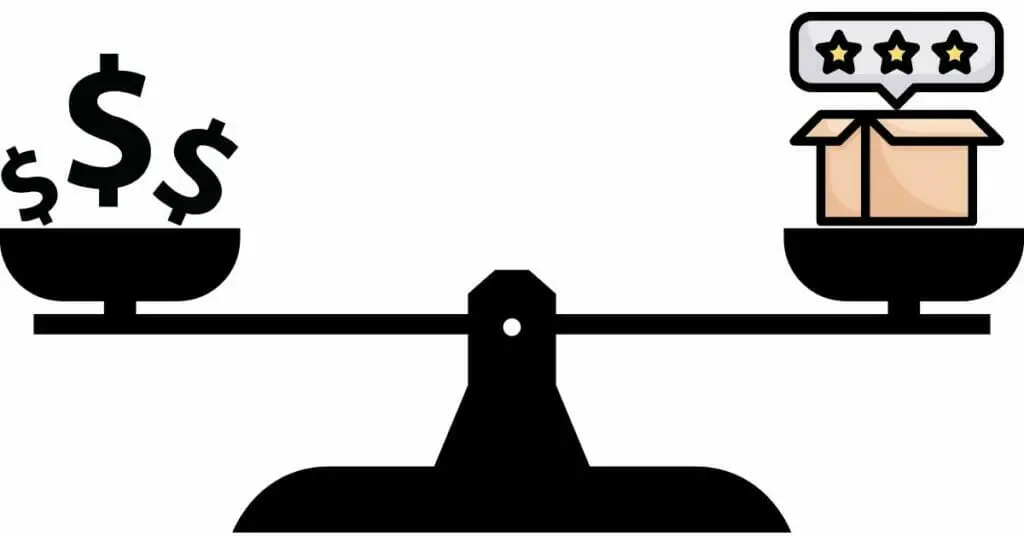11 Beginner Affiliate Marketing Mistakes to Avoid And Why
As a beginner in affiliate marketing, you are likely to make some mistakes along the way. That's perfectly normal and part of the learning process. However, some mistakes are more common than others, and in this blog post, we will discuss 11 beginner affiliate marketing mistakes to avoid and why. By avoiding these mistakes, you'll be well on your way to success as an affiliate marketer.
DISCLOSURE: Some of the links that I share in this article ARE my affiliate links. This means I may earn a commission, at no extra cost to you. In fact, sometimes you'll get a discount or free credits just FOR using my link. 🙂
Not Knowing Your Audience

One of the most common affiliate marketing mistakes is not knowing your potential audience. It's important to know who your target audience is so that you can select affiliate products and services that they are likely to be interested in.
If you don't know who your target audience is, you'll have a much harder time promoting products and services that they'll want to buy.
Not sure who your target audience is? Start by thinking about the age, gender, location, and interests of the people you are trying to reach. Once you have a deep understanding of who your target audience is, you can select products and services that they are likely to be interested in.
Another great way to get to know your target audience is to create a buyer persona. A buyer persona is a fictional character that represents your ideal customer. By creating a buyer persona, you can get a better understanding of the needs and wants of your target audience. This will help you select products and services that they are more likely to be interested in.
Picking the Wrong Products
The direct result of not knowing your audience is usually picking the wrong products. It's important to make sure that the products or services you promote are relevant to your niche and that they appeal to your target audience.
For example, if you have a blog about gardening, it wouldn't make sense to promote products that have nothing to do with gardening. Your audience would be confused, and you wouldn't be able to build trust with them.
Another thing is that just because a product is popular or has a high commission rate doesn't mean it's necessarily a good fit for your audience. You need to make sure the products you're promoting apply to your niche and offer value to your readers. Otherwise, they will not convert.
Not doing enough research on the company or product you're promoting

Before you promote a company or product, it's important to do your research to choose the right products to promote. If you're promoting products that no one wants or that are of inferior quality, you will not make any sales. So do your research and make sure you're promoting products that people want to buy.
You should also make sure that you're comfortable with the company's values and that you're confident in the product. Otherwise, you risk alienating your audience and losing credibility with them or promoting a product that isn't worth their time or money.
Doing too much research, on the other hand, can also be a mistake. If you spend too much time researching a company or product, you may never actually get around to promoting it. And if you're not promoting it, you're not making any money!
So balance doing enough research to feel confident in what you're promoting and not doing so much research that you never get around to promoting it.
Promoting a product or service you don't believe in and just for money
This is a mistake for two reasons. First, if you're promoting a product or service that you don't believe in, your audience will probably be able to tell and they won't trust your recommendations. Second, if you're only promoting something for the money, you're likely to get burned out quickly and give up on affiliate marketing altogether.
It's important to only promote products and services that you're passionate about and that you believe in. This way, you'll be able to put your heart into your promotions and build trust with your audience. Plus, if you're passionate about what you're promoting, it won't feel like work and you'll be more likely to stick with it for the long haul.
As an example, if you know two products and one of them is better but can give you a lower affiliate commission while the other is not as good but can earn you a higher affiliate commission, which one would you choose?
It's a moral dilemma. On the one hand, you can only make money if there is an affiliate commission to be made. You want to look your audience in the eye and say that you truly believe in the product or service that you're promoting.

The best solution is to find a happy medium. Select products or services that you genuinely believe in and that you think would be helpful for your audience. But also make sure that there is a good affiliate commission to be made so that you can earn a living from promoting the product or service.
But if this is not possible, I would choose to do the right thing and promote the product that I genuinely believe in, even if it means that I make less money.
If you're going to be an affiliate marketer, it's important that you only promote products and services that you believe in. Otherwise, you'll risk losing credibility with your audience and damaging your reputation. So make sure that you only promote products and services that you believe in and that you would recommend to your friends and family.
Promoting Low-Quality Products
To be a successful affiliate marketer, you need to promote high-quality products that offer value to your readers. If you promote low-quality products just for the sake of making a quick buck, people will catch on and they'll stop trusting your recommendations altogether. So don't do it! Respect your audience by only promoting products that are worth their time and money.
When you're first starting as an affiliate marketer, it can be tempting to promote any product or service that you come across. After all, you want to make money and the more products you promote, the more likely you are to make a sale.
However, it's important to only promote high-quality products and services. Otherwise, you risk damaging your reputation and losing the trust of your audience.
I had a first-hand experience when I saw that a popular affiliate marketer whom I follow promoted a new product to the followers enthusiastically, but only to realize that the product is buggy later. This is an obvious example of promoting a product or service just for the money. Not only did it cause problems for the affiliate marketer, but it also causes problems for the followers who trusted the affiliate marketer's recommendations.
Thus. it's better to promote fewer products and services that you believe in and that you know are high quality than to promote a bunch of low-quality products. Your audience will thank you for it and you'll be more likely to make sales in the long run.
Signing Up To Promote Too Many Products
One of the biggest affiliate marketing mistakes I see people make is signing up for way too many programs. If you're looking to get serious about making money blogging, focus on a few quality affiliate marketing programs. This gives you a chance to hone your skillset and learn what works best for your audience.
Don't just jump into promoting everything you find online. Start slowly and build up your knowledge. You don't want to be signing up for too many programs at once. This can confuse and overwhelm you.
Here are some things to consider when choosing your affiliate marketing program:

• Do they offer ongoing training? If you want to become successful, you'll need to invest in yourself. Make sure your partner provides regular training opportunities.
• What are the terms like? Most companies pay monthly commissions, but others give bonuses for reaching certain goals. Ask what type of commission structure they use.
• How much does it cost to join? Some programs charge a fee to apply, while others require nothing upfront. Look into whether you have to pay a monthly membership fee.
• Are there any special requirements? Is there a limit to the number of affiliates you can work with? Does your partner provide tools or resources to help you succeed?
I cannot over-emphasize the fact that quality is always better than quantity with affiliate marketing. It's better to focus on promoting a few high-quality products that you're passionate about rather than trying to promote dozens of products that you don't care about. Your audience will see through your lack of enthusiasm and won't be likely to buy anything from you.
Not Building an Email List From Day 1

If you're serious about making money as an affiliate marketer, you need to build an email mailing list from day one. This is the best way to keep in touch with your audience and ensure that they see your content regularly.
An email list is one of the most valuable assets an affiliate marketer can have. It allows you to directly reach your target audience with weekly or monthly updates about new products, special deals, and exclusive content they can't get anywhere else. If you're not building an email list from day one, you're missing out on a big opportunity.
Email marketing allows you to build relationships with your readers and sell products or services directly to them. It's one of the most effective ways to make money online and should be a top priority for any affiliate marketer.
The best way to build an email list is to offer something of value in exchange for an email address. This could be a free e-book, a minicourse, or even just a PDF with your best tips. Whatever you choose to offer, make sure it's something that your audience will find valuable.
There are several ways to do it, including pop-ups, form submissions, and optin boxes, but one of the most common methods is collecting emails from visitors to your site. This way you can build up a list of people interested in what you offer, and use those names to market products later down the road.
Don't make the mistake of thinking that you can wait to build an email list. The sooner you start, the better off you'll be.
Sacrificing Content Quality for Quantity

One of the biggest mistakes affiliate marketers make is sacrificing quality for quantity in content creation. They think they need to publish as much affiliate marketing content as possible to attract attention and drive traffic. But publishing low-quality content will only hurt your chances of success.
This is particularly the case given the recent Google Helpful Content update where good user experience is paramount. This update prioritizes content that is helpful, informative, and well-written in the search results. So if you're not writing quality content, you're not only missing out on traffic from Google, but you're also less likely to convert those visitors into potential customers.
You can check out my blog article on Google Helpful Content Update: What You Need to Know to find out more about what makes quality content?
It's important to remember that your goal should be to provide value to your readers and help your readers solve a problem, not just to publish as much content as possible. Write with the intention of helping your audience and don't be afraid to put quality over quantity.
This doesn't mean that you need to spend hours writing every blog post or article. But it means taking the time to ensure that your content is well-written and informative. Your readers will appreciate the effort, and you'll be more likely to achieve your goals.
It's better to focus on creating a few pieces of high-quality content that will resonate with your audience. If you can do that, you'll be much more likely to succeed than if you're just churning out low-quality content for the sake of it.
Fortunately, there is much you can do to ensure quality content. For example, always begin brainstorming post ideas by focusing on value with questions such as, “What value will this post provide to my readers?”
In terms of article creation, begin with an outline to give yourself focus. It will help you find and eradicate the weak points in your work. Finally, make sure you're also comparing yourself to your competitors – ensuring your content is bigger and better than theirs practically guarantees high-quality content.
There are a few key things to keep in mind:
– Your content should be well-written and free of grammatical errors. Strive to avoid long sentences and paragraphs. Studies have shown that after 25 words a sentence becomes difficult for people to read. The same approach applies for paragraphs, where you should keep them to 4 sentences or less whenever possible.
– It should be informative and helpful, providing value to your readers.
– It should be unique and original, offering a fresh perspective on a topic.
– It should be well-researched and backed up by data or expert opinions.
-And finally, it should be engaging and interesting to read. If you can create content that meets these criteria, you're on the right track.
Links Are Not Tracked And Managed
When you first start affiliate marketing, it's easy to get caught up in the excitement of making sales and generating income. But if you're not careful, it's also easy to let things slip through the cracks. One of the most common mistakes affiliate marketers make is failing to track and manage their links.
As an affiliate marketer, it's your responsibility to ensure that your links are working and that you're getting credit for the sales you generate. But many beginner affiliate marketers don't check their links regularly, or they don't have a system in place for tracking link performance.
This is a mistake because it's essential to track your links to identify which ones are performing well and which ones need to be improved. Without this data, you won't be able to make informed decisions about your affiliate marketing strategy.
Affiliate link management tools let you automate monitoring all your affiliate programs. A tool like Pretty Links makes it easy to manage affiliate links. This tool allows you to do link cloaking, track clicks, conversions, and other data for all your links in one place. It helps you keep track of all your affiliate links and monitor them automatically.
Make sure you're tracking your links regularly so you can make the adjustments to improve your results. If you're not tracking your links, you're missing out on valuable data that could improve your affiliate marketing strategy.
Also, make sure you have a system in place for tracking link performance and check your links regularly to ensure they're working properly. Broken links can hurt your brand's reputation and are a huge problem for merchants; you can lose out on affiliate sales due to broken links.
Not Tracking Your Results

If you're not tracking your results, you won't know what's working and what isn't. And without that knowledge, you won't be able to improve your campaigns or make the necessary changes to achieve success.
There are several things you should track, including:
– The number of visitors to your site
– The number of new visitors vs. returning visitors
– The source of your traffic (e.g., organic search, social media, paid advertising)
– The pages on your site that are being visited the most
– The amount of time people are spending on each page
– The number of conversions (e.g., sign-ups, sales)
– The conversion rate for each campaign
– The cost per acquisition (CPA)
– The return on investment (ROI)
This might seem like a lot of data to track, but there are several tools that can help you do it, including Google Analytics, which is a free tool that's easy to use.
Once you track your results, you'll be able to see what's working and what isn't. And from there, you can make the necessary changes to improve your campaigns and achieve success.
Not Organizing Affiliate Programs Signed Up
One of the biggest beginner affiliate marketing mistakes to avoid is not organizing the affiliate programs you have signed up for. This can lead to chaos and confusion down the road when you sign up for more programs, as it will be difficult to remember what you have signed up for and track all the different affiliate links and logins.
When managing affiliate programs, keep all information about them in one place. Doing this will help you keep track of the affiliate programs you signed up better, and it will save you time in the long run.
The best way to organize your affiliate programs is by category. This will make it easier to find the program you're looking for and to keep track of the progress you're making. You can also create a spreadsheet to help you track your progress.
You'll want to make sure that you know what each link represents, where it leads, how much commission you earn, and whether there are any fees associated with it.
Conclusion for Beginner affiliate marketing mistakes to avoid
So there you have it, our top 11 beginner affiliate marketing mistakes to avoid. If you can steer clear of these missteps, you'll be well on your way to success as an affiliate marketer. Of course, making mistakes is all part of the learning process, but knowing what not to do will help shorten that process and get you earning commissions sooner rather than later.
If you have any questions or would like more information, please don't hesitate to contact us. We're here to help!








